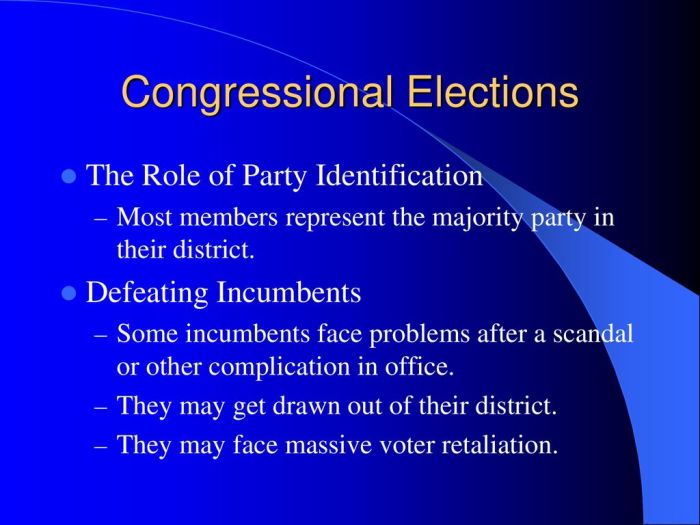Incumbents may have some problems in reelection campaigns if they do not address certain factors. This article will discuss the reasons why incumbents may face difficulties in reelection campaigns, provide examples of past incumbents who lost their bids for reelection, and identify common factors that contribute to incumbent defeats.
Additionally, the article will analyze the impact of economic conditions on incumbent reelection chances, examine the role of voter dissatisfaction with incumbent performance, and discuss the influence of challenger quality and campaign strategy.
Challenges for Incumbents in Reelection Campaigns

Incumbents face several challenges in reelection campaigns, including:
- Voter dissatisfaction with their performance
- Strong challenger candidates
- Negative economic conditions
- Changing demographics
- Increased voter turnout
Factors Affecting Incumbent Reelection Prospects
Several factors affect incumbent reelection prospects, including:
- Economic conditions:A strong economy typically benefits incumbents, while a weak economy can hurt their chances of reelection.
- Voter dissatisfaction:Incumbents who are seen as ineffective or unresponsive to the needs of their constituents are more likely to lose their reelection bids.
- Challenger quality:Strong challenger candidates can pose a serious threat to incumbents, especially if they are well-funded and have a clear message.
- Campaign strategy:Incumbents who run effective campaigns are more likely to win reelection. This includes having a strong ground game, a clear message, and a well-funded campaign.
Strategies for Incumbents to Overcome Reelection Challenges: Incumbents May Have Some Problems In Reelection Campaigns If

Incumbents can overcome reelection challenges by:
- Communicating effectively with constituents:Incumbents need to make sure that their constituents know about their accomplishments and their plans for the future.
- Raising enough money to run a competitive campaign:Incumbents need to raise enough money to fund their campaigns, including advertising, staff, and travel expenses.
- Running a strong ground game:Incumbents need to have a strong ground game to get out the vote on Election Day.
- Having a clear message:Incumbents need to have a clear message that they can communicate to voters.
Historical Trends and Case Studies

The reelection rate of incumbents varies depending on the political system. In the United States, incumbents have a high reelection rate, but it has declined in recent years. In the 2018 midterm elections, for example, only 90% of incumbents were reelected to the House of Representatives, down from 97% in 2016.There
are a number of factors that can contribute to an incumbent’s defeat, including:
- A strong challenger:A strong challenger can pose a serious threat to an incumbent, especially if they are well-funded and have a clear message.
- Voter dissatisfaction:Incumbents who are seen as ineffective or unresponsive to the needs of their constituents are more likely to lose their reelection bids.
- Negative economic conditions:A weak economy can hurt an incumbent’s chances of reelection.
- Changing demographics:Changing demographics can also affect an incumbent’s chances of reelection.
Clarifying Questions
What are some of the challenges that incumbents face in reelection campaigns?
Incumbents may face challenges such as voter dissatisfaction with their performance, a strong challenger, or unfavorable economic conditions.
What are some of the factors that can contribute to incumbent defeats?
Factors that can contribute to incumbent defeats include a weak economy, voter dissatisfaction, and a strong challenger.
What are some of the strategies that incumbents can use to overcome reelection challenges?
Incumbents can use strategies such as communicating effectively with their constituents, raising sufficient funds, and running a well-organized campaign.